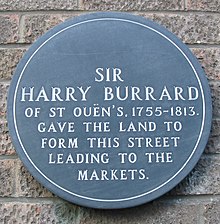| Revision as of 00:53, 13 December 2013 editChrisGualtieri (talk | contribs)Autopatrolled, Pending changes reviewers, Rollbackers457,369 editsm →References: Remove stub template(s). Page is start class or higher. Also check for and do General Fixes + Checkwiki fixes using AWB← Previous edit | Revision as of 13:15, 20 March 2014 edit undoPBS (talk | contribs)Autopatrolled116,854 edits Add DNB and ONDB into further readingNext edit → | ||
| Line 25: | Line 25: | ||
| * | * | ||
| * | * | ||
| ==Further reading== | |||
| *{{cite DNB |last=Stephens |first=Henry Morse|wstitle=Burrard, Harry|volume=7 |pages=}} | |||
| *{{cite ODNB |firt=Alastair W. |last=Massie |date=January 2008 |origyear=2004 |title=Burrard, Sir Harry, first baronet (bap. 1755, d. 1813 |id=4098}} | |||
| {{S-start}} | {{S-start}} | ||
Revision as of 13:15, 20 March 2014

Sir Harry Burrard, 1st Baronet (1 June 1755 – 17 October 1813) was a British General during the Peninsular War.
After Woolwich Burrard joined the Royal Artillery, the 60th Foot and the 1st Foot Guards, seeing combat in the American Revolution and the Revolutionary Wars. He was captured during a raid on the Bruges canal in 1798. He led the 2nd Brigade during the 1799 Anglo-Russian campaign in Holland, fighting at the battles of Bergen, Egmont and Castricum. In 1807, he commanded the 1st Division at the siege of Copenhagen.
Sir Harry Burrard had long since passed his prime when he took over the British army in Portugal from Sir Arthur Wellesley in 1808. Wellesley was one of the most junior Lieutenant-Generals in the British army, so for reasons of protocol, a more senior officer had to be placed above him.
Burrard stopped Wellesley's pursuit of General Jean-Andoche Junot after Vimeiro. It was his only real order during his one day in command of the army. He was replaced the next day by an equally cautious Sir Hew Dalrymple who began negotiations with Junot which led to the infamous Convention of Cintra. Recalled to London for an inquiry into the treaty, Burrard was placed in retirement from active duty.
Miscellaneous
- He was nicknamed Betty by his troops.
- The Burrard Inlet was named after his cousin, also named Sir Harry Burrard (1765–1840), by George Vancouver in June 1792.
- One of Burrard's sons was killed at the Battle of Corunna and another died in the breach at the Siege of San Sebastian.
- He appears in Naomi Novik's fifth Temeraire novel, Victory of Eagles.
See also
References
- Glover, Michael. The Peninsular War 1807-1814. Penguin, 1974.
- Smith, Digby. The Napoleonic Wars Data Book. Greenhill, 1998.
- British Columbia First Nations
- Napoleonic Guide
- memory.loc.gov
- ilmbwww.gov.bc.ca
- thepeerage.com
Further reading
- Stephens, Henry Morse (1886). "Burrard, Harry" . In Stephen, Leslie (ed.). Dictionary of National Biography. Vol. 7. London: Smith, Elder & Co.
- Massie (January 2008) . "Burrard, Sir Harry, first baronet (bap. 1755, d. 1813". Oxford Dictionary of National Biography (online ed.). Oxford University Press. doi:10.1093/ref:odnb/4098.
{{cite encyclopedia}}: Unknown parameter|firt=ignored (help) (Subscription or UK public library membership required.)
| Parliament of Great Britain | ||
|---|---|---|
| Preceded byEdward Morant Henry Goodricke |
Member of Parliament for Lymington 1780–1788 With: Thomas Dummer 1780–1781 Edward Gibbon 1781–1784 Robert Colt 1784–1788 |
Succeeded byRobert Colt George Rose |
| Preceded byRobert Colt George Rose |
Member of Parliament for Lymington 1790–1791 With: Sir Harry Burrard-Neale |
Succeeded bySir Harry Burrard-Neale Nathaniel Brassey Halhead |
| Parliament of the United Kingdom | ||
| Preceded bySir Harry Burrard-Neale William Manning |
Member of Parliament for Lymington 1802–1802 With: William Manning |
Succeeded byWilliam Manning John Kingston |
| Military offices | ||
| Preceded bySir Harry Burrard | Governor of Calshot Castle 1787–1813 |
Succeeded byThe Earl of Cavan |
| Baronetage of the United Kingdom | ||
| New title | Baronet (of Lymington) 1807–1813 |
Succeeded byCharles Burrard |
Categories:
- Use dmy dates from January 2012
- 1755 births
- 1813 deaths
- Baronets in the Baronetage of the United Kingdom
- British Army generals
- British Army personnel of the American Revolutionary War
- British Army personnel of the French Revolutionary Wars
- British Army personnel of the Napoleonic Wars
- British Army commanders of the Napoleonic Wars
- British MPs 1780–84
- British MPs 1784–90
- British MPs 1790–96
- Members of the Parliament of Great Britain for English constituencies
- Members of the United Kingdom Parliament for English constituencies
- UK MPs 1802–06
- Graduates of the Royal Military Academy, Woolwich
- Royal Artillery officers
- Grenadier Guards officers
- Royal American Regiment officers